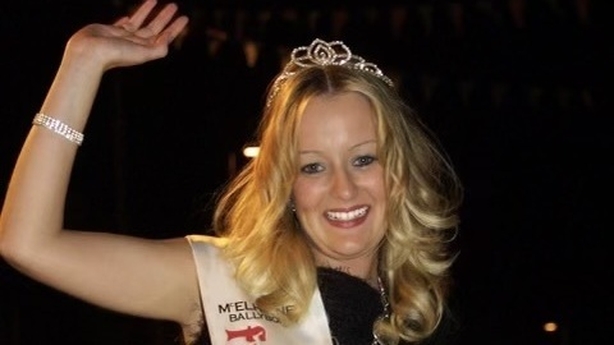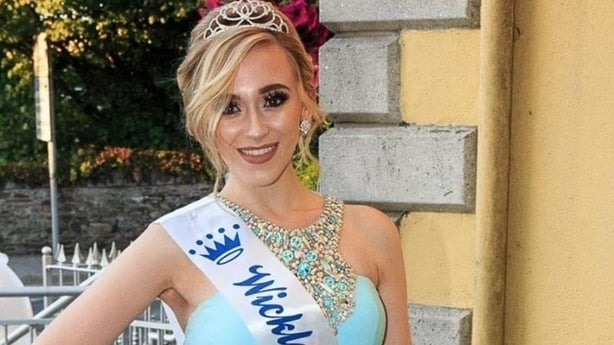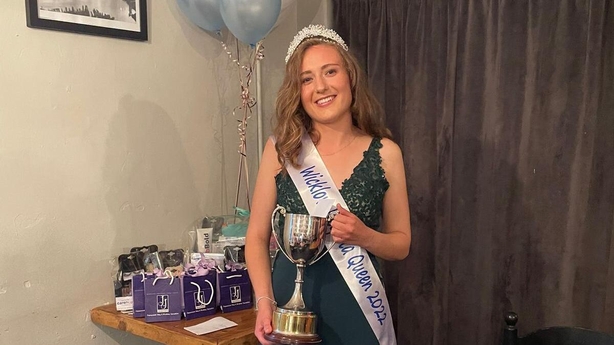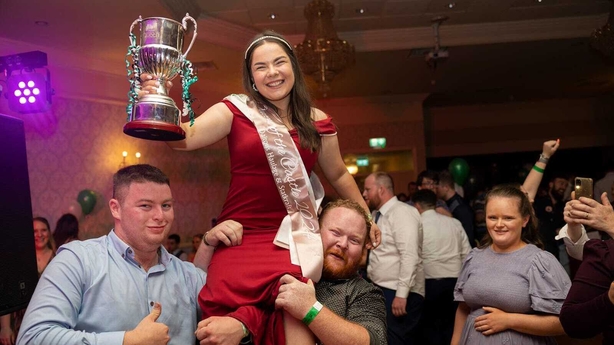As anticipation built for the 64th annual Rose of Tralee International Festival, a number of smaller scale local festivals were dusting themselves down after a busy summer.
There are many unique traditions and aspects to these local, national and international festivals across the country, but one tradition is held dear to a number of them - the crowning of a festival queen.
The events tend to see young women come forward to represent their area, a local business or charity. They must fit into a select age category, generally be unmarried, and be willing to be available to a festival committee for the duration, with the winner then participating in future events.
So how popular are these events proving to be for Gen Z, and how have the festivals themselves adapted to survive?
This year's Mary From Dungloe winner is 26-year-old Clare O’Donnell from Letterkenny, Co Donegal. The festival has been running since 1967, but Ms O’Donnell had never attended before applying.
She explains her reason for getting involved was to get out of her comfort zone and try something new to gain confidence.
"My aunt applied in 1984 and she encouraged me. I love getting dressed up and putting on make-up. I'm quite girly, but I’m not able to sing or dance like the other Mary's. I didn’t want to pressure myself into doing that aspect of it as I didn’t feel comfortable."
Ms O’Donnell said that her eyes were opened as she found out the festival is no longer overly focused on that, before she took part in the traditional crowning cabaret and winner's parade.
"I was amazed at how many people came to the festival.
"Beforehand I thought people would judge me for taking part. I felt that people would be looking at me saying: 'Who does she think she is’, but that didn’t happen. It made my family happy and brought us closer, my entire community was so supportive."

This year’s competition saw 14 entrants, including women from the outside Donegal, the US, UK and a representative from the UAE.
It has been 20 years since Lisa McKelvey from Dungloe was crowned the Mary From Dungloe, but her familiarity is life long, as her parents ran a local B&B which hosts competitors.
She remembers some stigma being associated with the festival, and that it can be seen as a type of ‘lovely girls’ competition, a nod to a famous episode of Father Ted in the 1990s.
"I probably had a little bit of reservation about doing it, but it definitely shaped my life and career.
"It’s about young, intelligent, driven, confident women, who are taking advantage of the platform to promote themselves, which the Gen Z generation is all about.
"It’s easy to have an opinion on something from the outside, but if you can see beyond the stigma and stereotype, you can reap the benefits if you make the most of it."
She said that the role of Daniel O'Donnell as the Master of Ceremonies draws in the older generation, but when they bring their families along, the interest trickles through.
Crona Byrne is a competition judge, and said social media is promoting the festival further, with competitors sharing their experiences online.
"There’s a whole lot more to this than girls competing against one another, and it’s not about beauty. The girls realise what a special place Donegal is and make lifelong friendships through it."
The Byrne family have been involved in the festival for three generations and Ms Byrne said that the festival would not be the same without this competitive element.
"My mother was the Oyster Pearl in Galway, and my parents Gay and Kathleen got involved as judges in Dungloe. I grew up with it and now my children enjoy it.
"It’s important to keep these festivals alive as it’s part of our history."
Galway’s International Oyster and Seafood Festival celebrates 70 years this year, but its associated festival Pearl competition was dropped 10 years ago.
A festival spokesperson said the primary reason for this was cost, but that in the 2010s, it also "lacked context".
"Our committee is made up of women and we didn’t want to be associated with something like this. The festival has gone from strength to strength since."
‘A decline in interest’
In Wexford’s tradition that began in 1967, the Strawberry Queen was crowned at the Strawberry Fair. In 2022, the festival became the Rockin’ Food and Fruit Festival, and what had been a focal point in the crowning of the queen, was lost.
Amanda Whitmore of the festival said that the team tried their best to revive it.
"We approached local businesses asking them to put a young woman forward, but we couldn’t get entries, there was no interest."
Less than an hour’s drive away from Enniscorthy in Wicklow town, you’ll find the longest running maritime festival in Ireland, the Wicklow Regatta Festival, which began in 1878.
The Regatta Queen Ball used to be a huge date on the social calendar, festival chairperson John Goodman said, but in recent years, there was a decline in interest.
"Before the pandemic, the contestants did panel interviews and performed talents in front of a crowd. It was not always an enjoyable experience, and it wouldn’t give everyone a fair crack at the whip."
The Regatta Queen competition is still running, but it has changed since the pandemic.
The safety and wellbeing of the queen is a top priority for the organisers, as they are escorted by the committee to and from every event.
"The judges always consider whether winning would be good for the girl, and whether she has the maturity for the role," Mr Goodman said.
"We don’t promote diversity with it, but it’s taken as a given that any young woman can apply, once she’s under the age of 26 and not married."
This year’s Regatta Queen was 20-year-old Maria Drobna who moved to Ireland two years ago from Kyiv in Ukraine. She said that the festival allowed her to become more integrated in the community.

"Moving to Ireland was very difficult, but now, I feel now I can build my future here.
"The Ukrainian Hub suggested I apply, and I did it without knowing what it was. But I found it was very positive and welcoming."
Erika Copeland, who was 18 when she was Regatta Queen in 2015, said that the festival was important for integration.

"Its popularity might have fallen recently due to Covid, but I hope it bounces back. There are people who have lived in Wicklow for generations but also new people coming in starting their families. It should be a great way to get to know each other and bring the community together."
In her own case taking part, she was inspired by her older sister who had participated in teen Miss Ireland competitions.
"Even if you're not the most confident person, it doesn't matter, because you will gain confidence during it because everyone is rooting for you. I was a theatre kid, so I didn’t mind the talent contest aspect of it.
"I hope the queen competition survives because it’s the pinnacle of the festival."
Alexandra Ludgate, 20, had just turned 18 when she was crowned the Regatta Queen in 2022, but it was something wanted to do from a young age.

"Whenever I saw the queens as a child, I used to think they were Disney princesses and looked up to them as role models. I wanted that for my own children in the future and to keep those traditions alive."
She described the role as misunderstood, with a lot of misconceptions about it, saying it was not the same idea as the Rose of Tralee.
"People think it’s a beauty queen contest, but getting a tiara was not the reason I put myself forward.
"The only thing that made me uncomfortable was being flirted with at some late night events. Some people think they can do that because of the role itself.
"Really to be the queen, you have to have good community spirit and be proud of your local area."
Despite her interest, Ms Ludgate does not think the tradition will survive gen-z.
"It breaks my heart, but I think it’ll slowly drift away as it’s not considered as important as it used to be. The sad thing is, I don’t think the festival would survive without the queen. These days, the way people put themselves out there is on Instagram, TikTok and Snapchat.
"The Regatta Queen can be required to be up and out on a boat on a Sunday morning in the rain, and I’m not sure generation z want to do that."
Filling the gap
The crowning of festival queens has long been associated with Macra na Feirme but some bigger calendar events like the Queen of the Land Festival and the Miss Macra Festival have not taken place recently.
In May, the Queen of the Land Festival announced the cancellation of this year’s event, saying it would return next year to mark its 60th year anniversary, but the Miss Macra Festival has been on hiatus since 2022.
There are local festivals associated with Macra that are going strong, such as the Blue Jean Country Queen Festival in Athboy, Co Meath which started in 1987.
This year saw 26-year-old Alannah Finnegan from Co Cavan crowned after 23 young women entered.
Chairperson of the festival Paul Gill said that the competition has changed over the years and is self-aware.
"These festivals can seem very old fashioned or prim and proper, ours isn’t, as it only slightly resembles what people think of with pageant competitions.
"We’ve stopped having escorts and doing fashion shows to focus more on the queens being together as a group having fun.
"It’s backed up by the whole community, not just those in Macra."
One community in Cahir, Co Tipperary has recently launched a new festival of this kind which is hoping to earn its place on the Macra na Feirme festival calendar.
The Queen of the Castle festival crowned its first queen this month, 21-year-old Ciara Duffy of Monaghan Macra, after 18 young women took part in the competition.

Daniel Long of the organising committee said that the idea was to put a modern twist on tradition, and fill what he saw as a gap in the market.
The festival team were delighted to receive some initial support from The 2 Johnnies, Tipperary County Council and local businesses.
"There has been a decline in recent years of these kind of festivals, and the area always had a tradition.
"We wanted to bring it back, but reflect how society has changed, making sure it’s not a ‘lovely girls’ event or a sexist contest, but showcases the diversity of women.
"We expanded the age profile, so it’s open to women up to the age of 40. This year’s winner is a woodwork teacher, loves hunting and panel beating, that’s what made her stand out.
"We got a very positive reaction, and we are hoping it’ll be bigger again next year."







